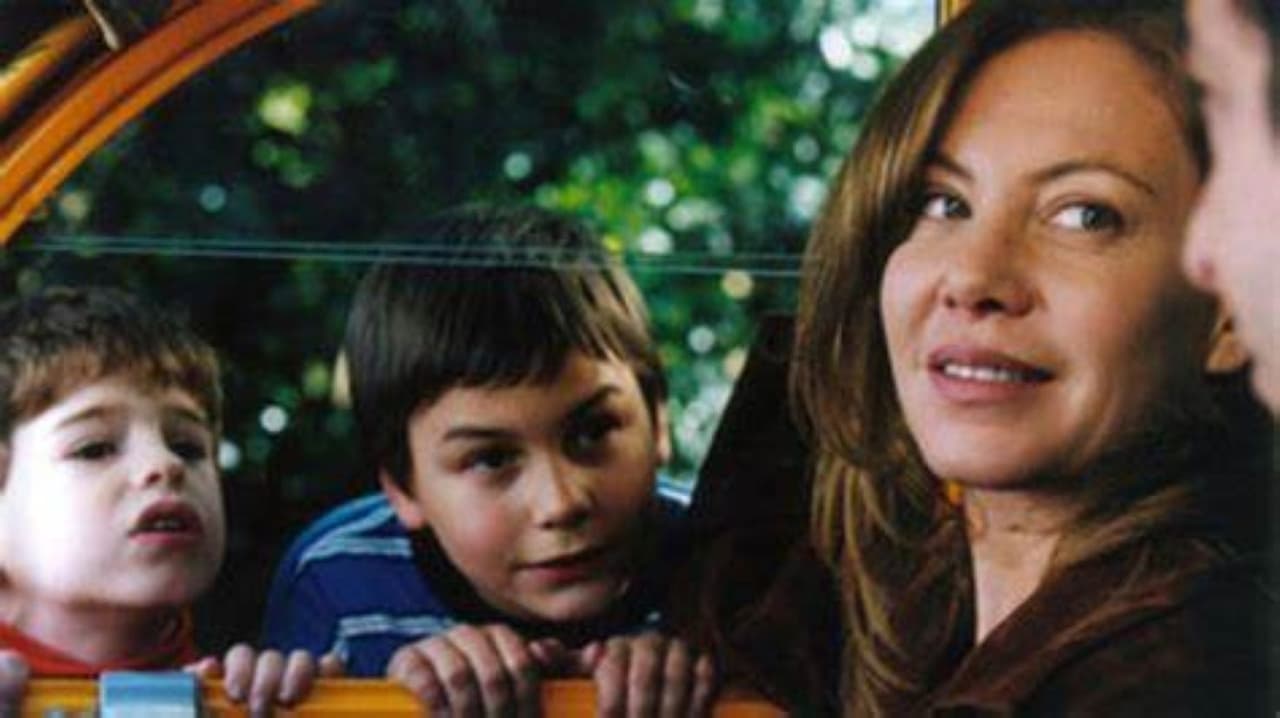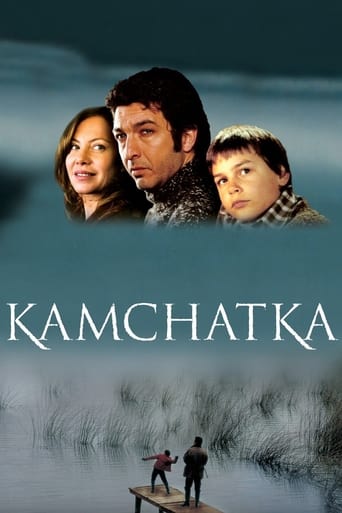

Excellent, Without a doubt!!
... View MoreThe best films of this genre always show a path and provide a takeaway for being a better person.
... View MoreThe film's masterful storytelling did its job. The message was clear. No need to overdo.
... View MoreAn old-fashioned movie made with new-fashioned finesse.
... View More"Kamchatka": More Than Just a War Game By: Maria Fernanda SuarezIn the Film Appreciation elective at my school we decided to watch the movie "Kamchatka" in the World Cinema Unit. Considering we are Latin Americans we decided to choose a movie from the region, although most of these movies are not easily available for rent or purchase. "Kamchatka" was a good choice because it reflects very efficiently the realities of the life for Latin Americans during a crisis. Although not everyone can relate to living in times of war, the movie focuses more on the family aspect of the situation, allowing most people to be able to connect to at least one of the characters.The movie "Kamchatka" is a narration about the way a young boy, Harry (Matías Del Pozo), interprets the historical events going on in his country. The storyline takes place in Argentina during the dictatorship of José Videla, featuring the coup d'etat in 1976 when he consolidated his power. His reign was right- winged and it was one of terror; anyone opposing the government's ideas was either killed or "disappeared." One afternoon Harry's mom picks him and his younger brother, El Enano (Milton De La Canal), early from school. The family must leave town for some time and retire to a house in the country. The movie follows the hardships of these troubled times from the eyes of a young boy who does not fully understand what is going on. Harry and his brother try to make the best of the situation, but their boyish curiosity creeps up often and their parents struggle to explain things in an understandable matter. Despite the parent's ability to keep the kids out of the conflict, in the scene with the grandparents it becomes evident how the political events are present in everyone's life, even in that of the youngest.The actors in general did a great job of portraying a family living in times of hardships by not over exaggerating events and dealing in common day-to-day situations and settings. For example, in the restaurant scene, the main family is shown dealing in an environment with other families. It highlights their troubles but does not making them overly evident as to seem fake. The kids' mom (Cecilia Roth) did a specially good role in the movie. Her smoking is the only way she can let out the frustration she feels as a concerned parent, considering that she has to keep a strong outer attitude to help her kids get through. The children's naiveness towards what is going on and their expected childish dilemmas also show very good acting from their part.What I enjoyed most about the movie "Kamchatka" is that it allows the viewers to put together the puzzle pieces of the story. We are never told why the family must leave, probably because this detail was not of much importance in the eyes of the narrator; Harry. This space for speculation engages the audience more and permits them to accommodate the movie in a manner that they can find useful. The physical settings of the story, specially the grandparent's house with the beautiful lake, show picturesque scenes that are memorable. The aspect that I liked the least in the movie was the lack of an emotionally impacting moment or action. I felt that the movie is missing a touching scene that binds an audience to a movie. Small details such as the mother's joy when Harry comes back from his escape do illustrate sentimental moments, but none stands out."Kamchatka" reinforces the value of family and love by showing the fragility and non- importance of material processions. The movie is an eye- opener to realities many people would not be exposed to in their usually conditions. In turn, it warns its audience about the severity of wars. The fact that Harry and his father play the war board game TEG emphasizes the foreshadowing of the evils of war. The only time Harry comes close to winning, his father holds on to one country: Kamchatka. This action of the father's to hold on to something till the very end, both in the game and in their real life, brings to light the values of dedication and perseverance.Younger kids would probably not understand the prevalent and underlying conflict, yet they would be able to follow the simple tram of the kid's actions and enjoy the movie. It is very adequate for teenagers looking to experience a different culture and learn about a historic event in a more personal way. The magic about the movie is that anyone can connect to some aspect of it; either the situation, a character, or the time period. Rating: 4/5*Maria Fernanda is a sophomore in a Costa Rican high school. Her favorite subject is History, being it the reason attributed to her passion for reading and watching movies. She feels both books and movies tell incredibly valuable stories that give the audience insight into events they would never know about. She believes that the power of these communication tools is so strong they can definitely change the world for better or for worse.
... View MoreThis film leaves you all possibilities to form your own impressions. From the beginning till the end there are no data which supply you information about the the characters, what was their fault, what did they do and what would happen after. Still, all these questions are automatically answered when one knows and realizes what was happening in Argentina. The close harmony in which the family lives, the game the father is playing with his son has a educational life value. He will learn how to manipulate and stand in the world when he has grown up. The decision to bring their children to their grandfather,the running after a leaving car, gives you all the reason to use a handkerchief. Who wants to leave his children behind? What will happen to the parents? It is amazing that still today, there are people like Mr Zorrequita who deny that this ever happened. They simply did not know??? Where have we heard this before? A beautiful film. TOP
... View MoreThis film is delightful and one which will leave you enchanted. I cannot understand some of the comments that say the reason why the family is on the run is never explained - it is! The father is described as a lawyer whose speciality is working with people who have been accused of political crimes. When his partner is arrested and goes missing- he knows that time is running short for him under the new military regime after the coup and decides to take his family underground to escape the same fate. Outstanding performances all round - Darin and Roth are electric - and it is so nice to see a film that portrays a strong husband/wife bond rather than a dysfunctional one. The child actors are impressive without displaying that smug awareness ("look at me, aren't I clever") that spoils many a performance by an American child. Touching and poignant, a must see that just emphasises the strength now coming through from Argentinian cinema.
... View MoreKamchatka is a terrible film. I believe what seems to pass for "understated" is its plain dullness, and the main character (a kid whose POV is nominally carrying the movie) doesn't show a single instance of child-like perception - save for a couple of commonplace animal shots, the kid sees the world exactly as the rest of Piñeyro's characters; a polite, well-framed shot by Alfredo Mayo. Since "Caballos Salvajes" I've been trying to figure out who the bad guys are in Piñeyro's films (back then, bullets always came from outside the frame). I'm sad to report things have gotten even worse, since now we need to resource to _our_ (external) knowledge of the period to understand what's going on. He seems to get away with it because, sadly, not that much happens in the movie, anyway.Kamchatka might be worth seeing, however, if you're interested in recent developments in the political genre. It was interesting to me how, by trying to detach itself from the political movie tradition, it achieves the complete opposite: this is a film that couldn't possibly make sense unless you are not only aware of the external circumstances that affect the characters but also have already a clear position on the political conflict in case.As justified as the generic, elegiac tone of the movie may be in the real world, its fictional consequences are devastating. It leaves us with no real characters and not a single dramatic scene proper.Characters here are archetypes and, most of the time, it's not entirely clear of what. It doesn't help that the movie looks often derivative of other films that have successfully portrayed the specifics of perception in children (the soundtrack mimicking Thomas Newman is particularly painful in that respect).Piñeyro's former writer (Aida Bortnik, who also wrote The Official Story) used to be quite annoying to me, but at least she seemed to know and like drama as a tool.
... View More